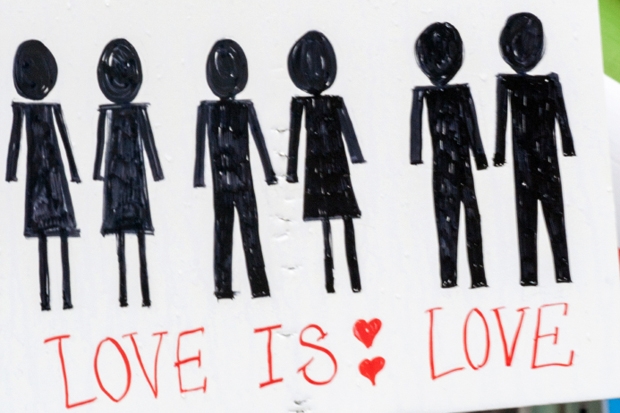I’m not aware of knowing many bisexual people. Or indeed, off the top of my head, any bisexual people. Which is odd, really, because back in my student days you couldn’t move for them. Being bisexual was quite the thing. Or, at least, claiming to be was. The girls really dug it.
This was back in the mid-1990s, not long after the lead singer of a band called Suede, who is a man called Brett Anderson (married to a lady now; two kids) had declared himself ‘a bisexual man who has never had a homosexual experience’. That, at the time, was very much the sort of sexual identity that a trendy, bohemian young chap, of the sort I very much wanted to be, was supposed to be aspiring towards. Or, as Irvine Welsh had Renton put it in Trainspotting, ‘One thousand years from now, there won’t be any guys and there won’t be any girls, just wankers. Sounds all right to me.’
It wasn’t easy, though. For one thing, I wasn’t at all sure which men to pretend to fancy. Normally people overcompensate wildly in this sort of situation — as with closeted young men who put up posters of Pamela Anderson and suchlike — but if I’d claimed lust for, say, Sylvester Stallone, I’m not sure anybody would have believed me. The safe option was Johnny Depp. Everybody fancied Johnny Depp. He had big beautiful eyes and long hair and perfect cheekbones, although I wasn’t really sure what I’d actually want to do with him. It would have been so much easier if he’d had a vagina.
Obviously though, I do actually almost certainly still know quite a lot of bisexual people. Everybody does. Depending, that is, on what the word means. I will know people now in straight relationships who want to have occasional flings with people of their own sex, and perhaps even do, and I probably know gay people who do the opposite. And if they no longer choose to identify themselves in that sort of way, well, no wonder. When you marry or settle down, making a song and dance about all the other people you faintly want to sleep with is simply churlish. One of the strangest and softest bigotries about ‘alternative’ sexual orientations is the notion that they must entail a sense of compulsion. As in, if you spend a while dating blondes and brunettes, nobody ever suggests that this leaves you predisposed to cheat on your brunette wife because you so badly miss the blonde thing.
What seems to be changing, though, is the urge to make a fuss about all this, even in the painfully right-on fashion of the likes of me. According to a story in the Times earlier this week, YouGov has found that almost half of young people (18 to 24) today consider themselves to be neither heterosexual nor homosexual, but something in between. Almost half. That’s a lot. Not a trendy fringe like my lot in the 1990s, but almost a new normal. It made me think of a scene in the film 21 Jump Street where two policeman feign youth to infiltrate a high-school drug gang, try to fit in by punching somebody for being a geek, and then end up being ostracised by their new classmates because he turns out to be gay, too.
The point is, though, they probably wouldn’t actively call themselves bisexual, either. In the most recent census, the figure claiming that among the same age group was a mere 2.6 per cent. Which may mean, I suppose, that they’re all either lying to the census, or lying to YouGov.
Only I’m not sure it does. Rather, I think this is what progress looks like. An absence of fuss. Sexuality, 20 years on, is less about what you are and more about simply what you do. Although what people actually do, I’d bet, will carry on being much the same as what they always did.
The Corbyn crowd
People keep asking me if I think Jeremy Corbyn is anti-Semitic. I don’t. Or at least I think it’s vanishingly unlikely. Why would he be? For all his political unorthodoxy in various directions, his antipathy towards bigotry seems wholly genuine. Indeed, it seems the whole point. I don’t see how it could have such a big blind spot.
If the question gets asked, however, and angrily, I don’t think he’s blameless. My own political awakening came with the pending Iraq war in 2003. I was against it, noisily. I remember quite clearly the first anti-war march I attended, probably in late 2002. Everybody had the same placard, handed out by the organisers. ‘Don’t Attack Iraq’, it said. And then underneath: ‘Justice For Palestine.’
I didn’t understand why. I still don’t. It’s not that I’m against justice for Palestine, but that wasn’t what I’d gone to march about. The connection between Israel and the Iraq war was so tenuous as to be nonexistent, but a strong streak of the Stop the War movement always wished it was stronger. When issues weren’t about Israel — and believe it or not, many aren’t — they always transparently wished they were.
This, for two decades, has been Jeremy Corbyn’s political hinterland. From it sprang all the strange associations he is now accused of having, with all those strange people who think such troublesome things. He could have called it out 20 years ago, had he wished. He didn’t wish. This is what you get.







Comments